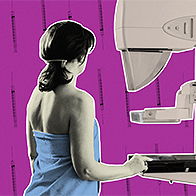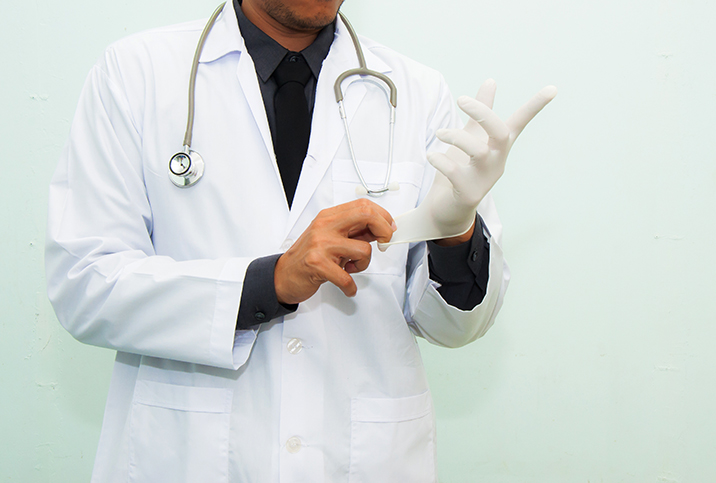Get Back on Track With Your Cancer Screenings

Given the past year or so of lockdowns and distancing due to COVID-19, you'd be forgiven if you skipped your cancer screenings and slipped off schedule. If this sounds like you, it's time to get back on track, especially if you're at higher risk for certain cancers.
If you're screening to stay ahead of health complications, or simply don't know which cancers are the most important for screenings, here's some information as a starting point.
Top 5 cancers women should screen for
According to Cancer Screen Week, a public health initiative to increase awareness around the potentially lifesaving benefits of getting screened for recommended cancers, these are the most prevalent cancers for which women should be screened:
Breast cancer
"Most women at average risk should have the option to begin screening at the age of 40 at least once a year. That recommended age is lowered for women with a strong family history of breast cancer. They should begin screening in their 30s," said Sung Poblete, Ph.D., R.N. and CEO of Stand Up To Cancer (SU2C). "Women ages 45 to 55 should get a mammogram every year. At age 55 and older, women can switch to a mammogram every two years or continue annual screening."
Cervical cancer
Poblete said screening for cervical cancer should begin around age 25 and be scheduled every five years unless otherwise instructed by your healthcare provider.
Two screening tests are used to detect cervical cancer, according to the Centers for Disease Control and Prevention (CDC). A Pap smear can find precancerous cells in the cervix, and the human papillomavirus (HPV) test looks for this extremely common virus that can cause cells in the cervix to change. Both tests can be performed by your gynecologist or at a clinic, although you will probably get a Pap smear test as part of your annual physical. If your regular Pap smear tests results are all clear, your doctor may recommend waiting three years before your next one.
Colorectal cancer
Poblete recommended beginning colorectal cancer screening at age 45. However, it's important to note new cases of colon cancer and rectal cancer are occurring at an increasing rate among young and middle-aged adults in the United States.
"There are several effective screening tests, including tests conducted at a healthcare facility or at-home tests," Poblete added. "The frequency of the screening varies based on the type of test and your age, so it's best to consult with your healthcare provider."
Lung cancer
For smokers and others at high risk, it's recommended to start screening at age 55 and continue doing so once a year, according to Poblete. The CDC advises that people with a 20-pack-per-year or more smoking history, those who smoke currently or have quit in the past 15 years and those between 50 and 80 years old should be screened.
The screening test for lung cancer is called low-dose computed tomography (LDCT) and comes with risks including false positives, overdiagnosing and cancer in otherwise healthy people due to radiation from repeated LDCT tests. Even given those caveats, screenings are still highly recommended for adults at high risk.
Skin cancer
"Skin cancer can impact anyone at any age. It's important to know your own skin and talk to your doctor about unusual moles or any areas that are new or changing in size, shape or color," Poblete said.
There is not enough scientific evidence to support a recommendation for routine total body skin cancer screenings for people without a history of skin cancer or without suspicious moles, according to the CDC and the U.S. Preventive Services Task Force.
Top 5 cancers men should screen for
Here are the most common cancers for which men should be screened, according to Poblete and the Cancer Screen Week collaborators:
Prostate cancer
Poblete advised all men ages 50 and older with an average risk should be screened for prostate cancer.
"For certain high-risk groups, such as Black men and men with a family history of prostate cancer, screening may need to begin at age 40 or 45," she added. "There are issues that make it unclear if the benefits of screening outweigh the risks for most men. The decision to be screened should be made after talking with your doctor about the risks and benefits of screening."
Lung cancer
For men, the same guidelines are in place as detailed above for women. For smokers and others at high risk, the recommended age to begin screening is 55 and should occur once a year.
Colorectal cancer
Colorectal cancer is the third most common cancer diagnosed in both men and women in the U.S., according to the American Cancer Society. The screenings should begin at age 45, and your doctor can help you determine whether an at-home test or a screening at a medical facility is right for you.
Bladder cancer
Although there's no specific screening test for bladder cancer, it is the fourth most common cancer diagnosed in men in the United States. Frequent and painful urination, back pain and discolored urine are typical symptoms of bladder cancer, and you should speak with your doctor if you experience any of these issues.
The best advice to avoid bladder cancer is to quit smoking, keep clear of chemicals used in the manufacture of leather, rubber, textiles and paint products, and eat brightly colored fruit and vegetables for their antioxidants.
Skin cancer
Similar to women, men should be aware of the normal state of their skin and report any new moles or unusual changes to their doctor, as there is no routine total body skin cancer screening currently recommended.
Back to scheduled screenings
"The COVID-19 pandemic led to a significant drop in cancer screenings. For example, colonoscopy screening dropped by approximately 90 percent around the start of the stay-at-home orders last spring [2020]," Poblete said.
"While many cancer screening rates have now started to rebound, the entire medical community needs to continue to encourage patients to get screened so we can get back to pre-pandemic screening levels and then increase screening rates even more from there," she continued. "Healthcare facilities across the country have implemented many precautions to provide patients with a safe experience for these important tests."
There's no excuse. It's time to check the calendar, make an appointment with your doctor and start scheduling cancer screenings. Cancer is most treatable when it's detected early, so start dialing now.




















